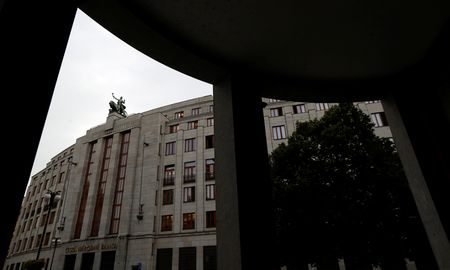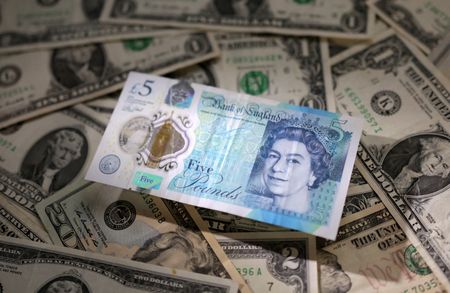By Jason Hovet
PRAGUE (Reuters) -The Czech National Bank paused its year-long rate-cutting campaign as expected on Thursday, leaving its main rate at 4.00% as inflation pressures in the service sector kept it cautious.
The Czech central bank board voted 5-2 to keep rates unchanged – with two members wanting a 25 basis point reduction – and joined peers in central Europe in pausing easing cycles, although analysts expect the bank could resume gradual cuts early in 2025.
Thursday’s Czech decision marks the first time since Hungary started cutting rates in May 2023 that all four of the region’s banks have kept rates on hold in the same month.
After the inflation surge of recent years pushed borrowing costs to the highest in over two decades, the Czech central bank began cutting in December 2023 and has reduced its main rate by 300 basis points in that time.
But it had been signalling a pause may be near.
“The disinflation process in the core components of the consumer basket, especially in the services sector, is not yet completed,” Governor Ales Michl said.
“For these reasons, the bank board decided to pause the interest rate reduction process for the time being.”
Michl said the board was most likely to debate keeping rates stable or cutting at its next meeting in February.
Nine of 12 analysts in a Reuters poll last week forecast a return to cuts in the first quarter, when the bank meets twice.
The Czech central bank, like others, is balancing still fast growth in service sector prices and a strong labour market against a weak economic recovery stemming from poor sentiment and sagging foreign demand, especially from Germany.
Headline inflation has edged up from early-2024 lows to 2.8% year-on-year in November, staying within the upper boundary of the 1-percentage-point tolerance band around the 2% target.
The bank expects a temporary pick-up in inflation in the short term due to food prices and base effects, before returning to the upper half of the tolerance band early next year.
The bank will already have a flash inflation estimate for January when it meets next.
CNB Vice-Governor Eva Zamrazilova, who had backed a pause at the last meeting in November, told Reuters this month that further easing may be up for future discussion if consumer prices data for January gave positive signals.
Analysts have said the bank could continue cuts next year to take the main rate to as low as 3.00%.
“According to our forecast, the recovery in the domestic economy should be more moderate than the CNB is counting on, and we also expect the crown to be stronger,” Komercni Bank analyst Jaromir Gec said.
The crown was a touch weaker on Thursday, at 25.14 to the euro, and is hovering below three-month highs hit last week.
(Reporting by Jason HovetEditing by Keith Weir and Alison Williams)










